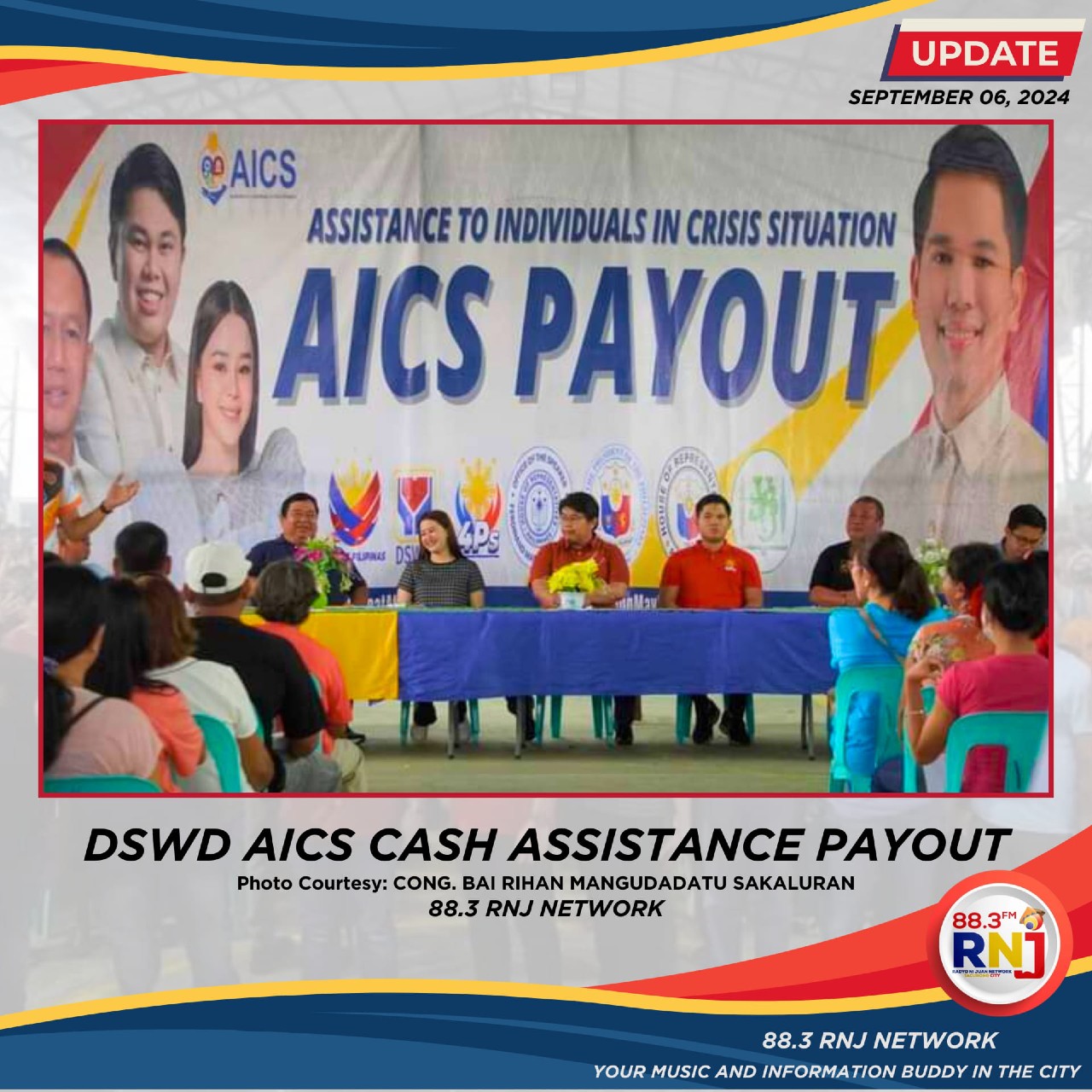The Department of Social Welfare and Development (DSWD) runs the Assistance to Individuals in Crisis Situation (AICS) program with the goal of providing immediate aid to individuals and families facing unexpected crises. This program primarily supports vulnerable sectors such as the poor, marginalized, and financially disadvantaged individuals affected by economic challenges like the COVID-19 pandemic and rising inflation.
To enhance the efficiency of the AICS program, revisions to the implementing guidelines.of the program have been made. These changes helped streamline procedures, adjust assistance rates, and simplify documentary requirements, ensuring faster delivery of support to those in need. Such efficiency is necessary especially for the individuals and families in crisis, preventing further hardships. Understanding this helps us access the same timely support, particularly when faced with emergencies and urgent need for resources that can provide relief in difficult situations.
Understanding the DSWD AICS
The AICS program, initiated by the DSWD, serves as a social safety net designed to support individuals and families facing unexpected crises. AICS provides immediate financial and non-financial assistance to help meet basic needs during emergencies, such as medical issues, loss of a family member, or natural disasters. The program aims to reduce, if not entirely abolish, the hardships faced by vulnerable populations, ensuring their well-being and stability during challenging times.
AICS was formalized through a series of guidelines and memoranda starting in 2014, which established its operational framework. The program has since evolved, and now includes various forms of assistance, such as medical, burial, transportation, educational, and food aid, reflecting the changing needs of the community. Recent enhancements have also expanded its reach and funding, with additional allocations approved to support the increased demand for assistance, thus solidifying AICS as a social protection strategy of the Philippine government.
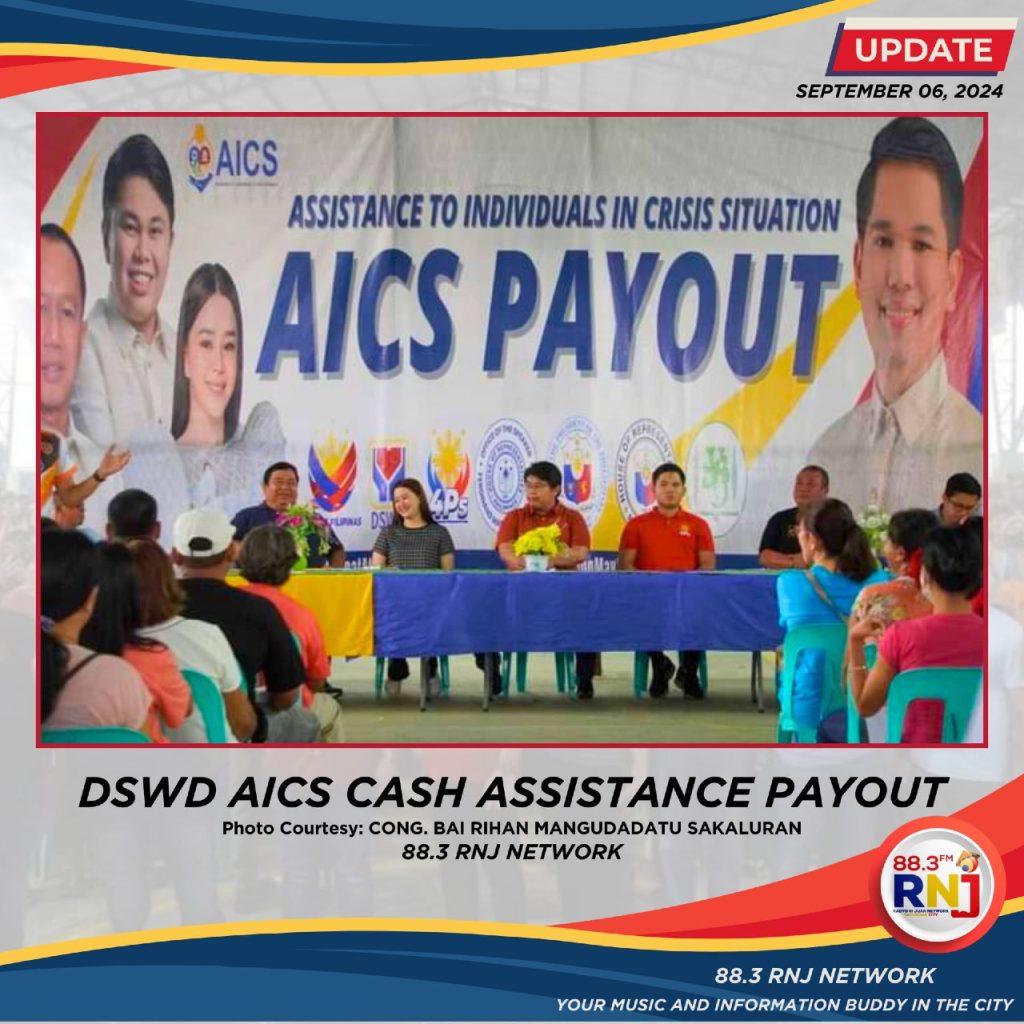
Legal Bases
The legal bases for the DSWD AICS program ensure that it aligns with national laws promoting efficient service delivery and financial assistance for individuals in crisis. Several improvements have been made to streamline the program and enhance access to aid.
- RA 11032: Mandates reengineering of systems to reduce bureaucratic red tape.
- RA 11463: Ensures DSWD financial aid through Malasakit Centers.
- EO No. 221 (2003): Directs DSWD to provide crisis intervention.
- EO No. 137 (2021): Institutionalizes the AHON Convergence for unified social services delivery.
- EO No. 163 (2022): Provides protection services for refugees, stateless persons, and asylum seekers.
Program Beneficiaries
The DSWD AICS program provides assistance to individuals and families facing unexpected crises or extreme difficult situations, based on the assessment of a DSWD Social Worker. The program beneficiaries may include, but are not limited to:
- Persons of Concern (POCs): As defined under EO No. 163, series of 2022.
- Individuals and families in crisis situations: Experiencing unexpected emergencies or extreme hardships.
- Persons in difficult life circumstances: Facing challenges that require financial or material support.
- Augmentation to LGU assistance: AICS may provide additional aid to individuals already receiving support from their Local Government Units.
DSWD AICS Program Coverage
The DSWD AICS Program offers various forms of assistance to help individuals and families in crisis, covering essential needs like medical, funeral, transportation, and education. This program ensures financial, material, and psychosocial support, as well as referrals for services beyond AICS’ scope. Each type also comes with a prescribed limit on the number of times an individual may avail of a particular type of assistance at a given period (frequency of availment) and this should not be interpreted as giving the client the privilege/premium to claim the assistance repeatedly as the period comes.
Here are the various programs under the AICS, along with information on the rates of assistance and the frequency of availment for each type:
Financial Assistance
This program under the DSWD AICS refers to the cash or guarantee letters (GL) given to eligible individuals or through service providers for the following purposes:
1. Medical Assistance
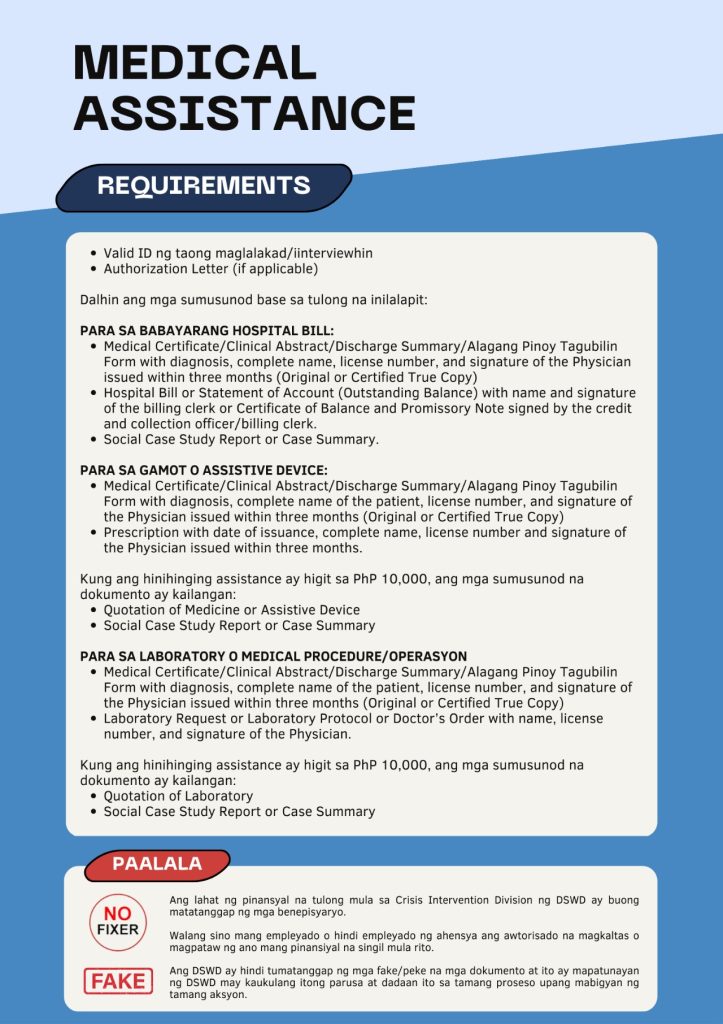
This covers the cost of hospitalization, medicines, and medical procedures like implants and tests. It also includes help for postpartum complications and other serious health issues, as well as providing assistive devices like wheelchairs. However, it does not cover expenses like immunization, birthing, or vitamins not related to treatment.
Particulars: Hospital bill
Cost of Assistance: 1,000.00 – 150,000.00
Frequency of Availment:
General Rule: Once every admission/ discharge
Exceptions: For chronic diseases or illnesses Per hospitalization/ admission
Particulars: Medicines
Cost of Assistance: 1,000.00 – 150,000.00
Frequency of Availment: Once every three months
Particulars: Laboratory Procedures
Cost of Assistance: 1,000.00 – 150,000.00
Frequency of Availment: Once every three months
Particulars: Other special treatment such as, but not limited to dialysis, chemotherapy implant and pre-operation procedures
Cost of Assistance: 1,000.00 – 150,000.00
Frequency of Availment: Once every three months
2. Funeral Assistance
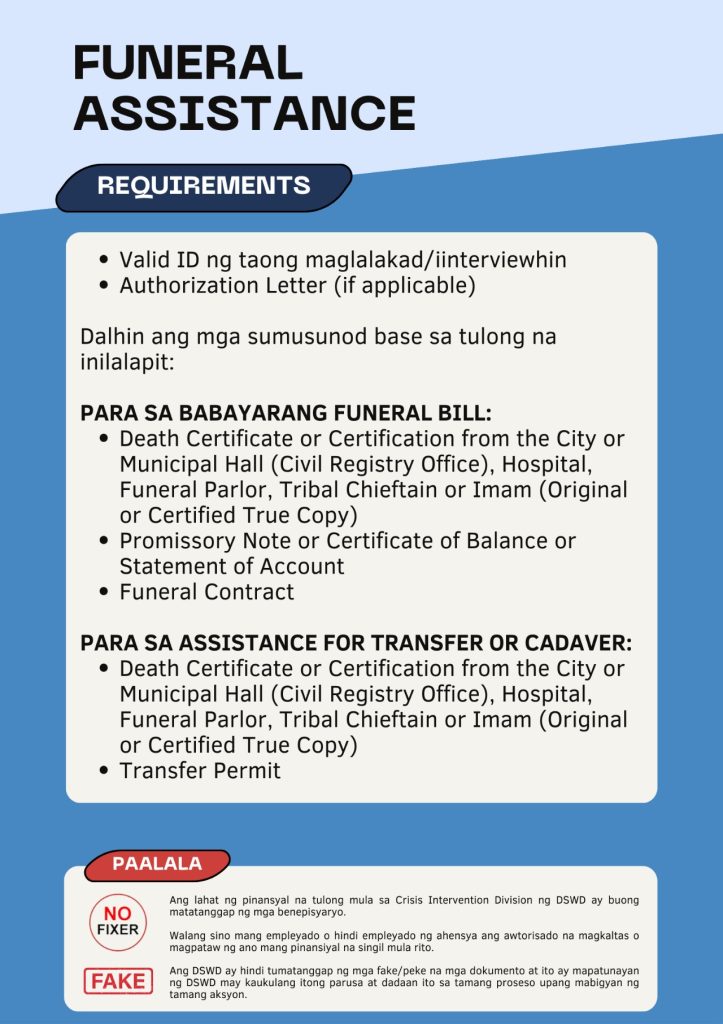
This covers funeral expenses, including bringing the deceased home, interment, cremation, or burial. In cases of multiple family casualties due to disasters or emergencies, immediate relatives may request cash assistance. Funeral assistance is given based on the customs of the family, especially among Indigenous Peoples and Moros.
Particulars: Funeral Expenses
Cost of Assistance: 5,000.00 – 50,000.00
Frequency of Availment:
General Rule: Per beneficiary/incident of death
Particulars: Transfer of Cadaver
Cost of Assistance: 5,000.00 – 50,000.00
Frequency of Availment:
General Rule: Per beneficiary/incident of death
Particulars: Casualties during disaster/ calamity
Cost of Assistance: 5,000.00 – 10,000.00
Frequency of Availment:
General Rule: Per beneficiary/incident of death
Note: One may avail of or process one or two services at the same time (i.e. Funeral and transfer cadaver) subject to the recommendation of DRMG counterparts of the region.
3. Transportation Assistance
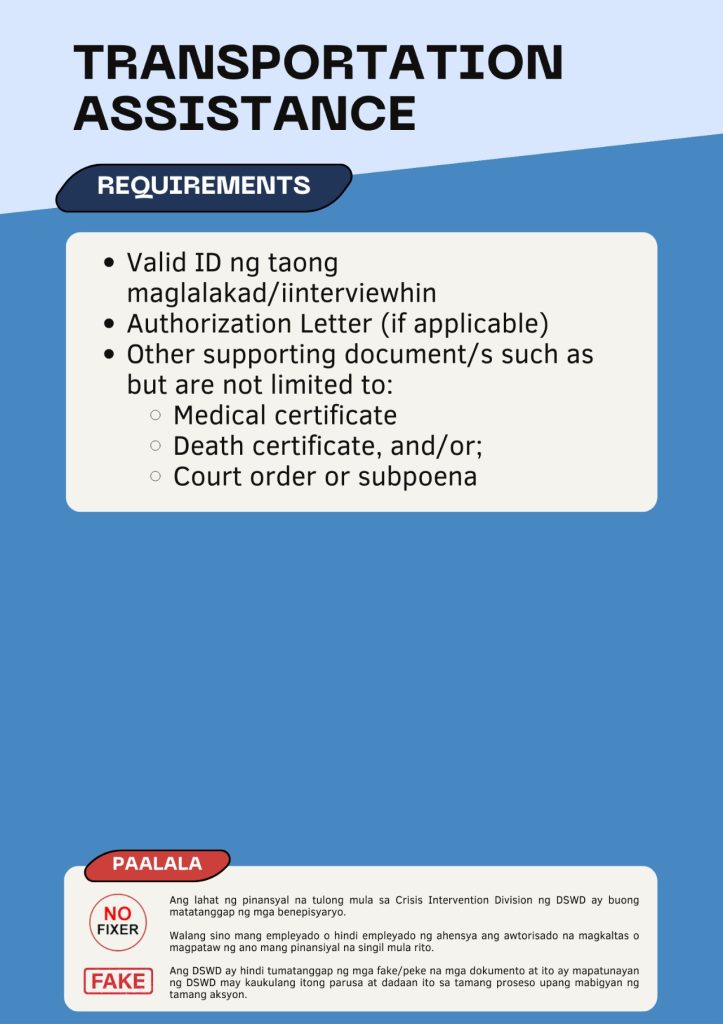
This helps with travel costs within the Philippines, such as returning to a home province, seeking medical care, or attending to emergencies like the death of a family member. Cash may be given for complex travel needs involving multiple modes of transport. If DSWD arranges the ticket, additional cash for food and other travel needs may also be provided.
Particulars: Land/Sea/Air Travel
Cost of Assistance: Actual Cost based on ticket price and/or other travel expenses.
Frequency of Availment:
General Rule: Once a year
Exceptions where they can claim more than once include cases such as:
(a) Travel due to the consecutive death of an immediate family member such as spouse, parents and children
(b) Travel for medical reasons as the need arises
4. Educational Assistance
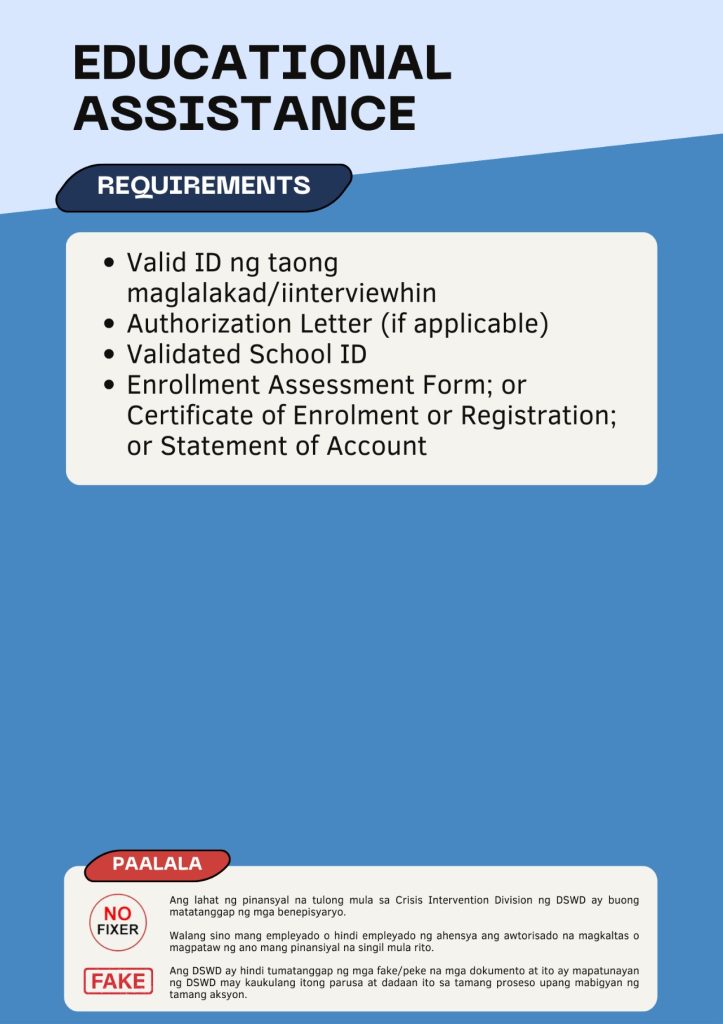
Educational assistance is a program designed for students in crisis to cover school expenses like fees, supplies, and projects. It is available to breadwinners, working students, orphans, and children of unemployed or overseas parents, as well as children affected by illness or calamities. A maximum of three students per family can receive this help, but it does not cover advanced degrees like medicine or law.
Particulars: Elementary students
Cost of Assistance: 1,000.00 – 5,000.00
Frequency of Availment: Once every school year
Particulars: High school students
Cost of Assistance: 2,000.00 – 5,000.00
Frequency of Availment: Once every school year
Particulars: Senior High School
Cost of Assistance: 3,000.00 – 10,000.00
Frequency of Availment: Once every semester (varies per region) preferably done offsite
Particulars: College and vocational students
Cost of Assistance: 4,000.00 – 10,000.00
Frequency of Availment: Once every semester (varies per region) preferably done offsite
Note: Educational assistance is granted in coordination the Department of Education (DepEd)/ Commission on Higher Education (CHED)/ Technical Education and Skills Development Authority (TESDA)
5. Food Assistance
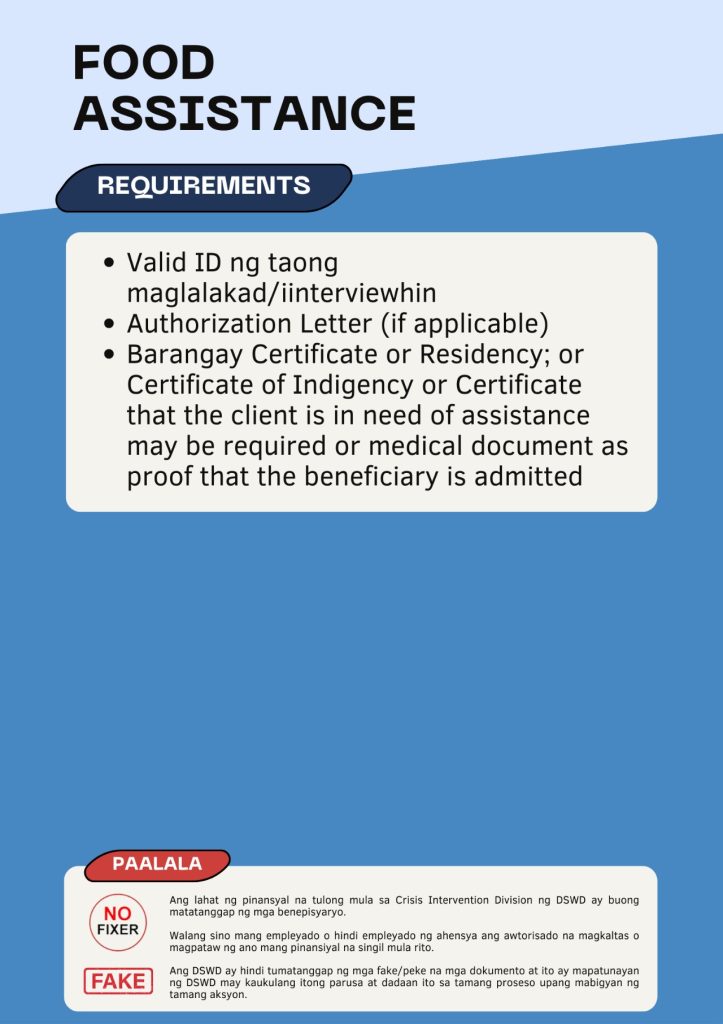
This provides help with food and nutritional needs for families in crisis. It can also be given as cash in addition to other types of assistance like transportation or medical aid. The goal is to ensure that basic sustenance needs are met during difficult times.
Particulars: Food subsidy for individuals/ families
Cost of Assistance: 2,000.00 – 5,000.00
Frequency of Availment: General Rule: Once quarter every
Exception/s: Patients once every admission
6. Cash Assistance for Other Support Services
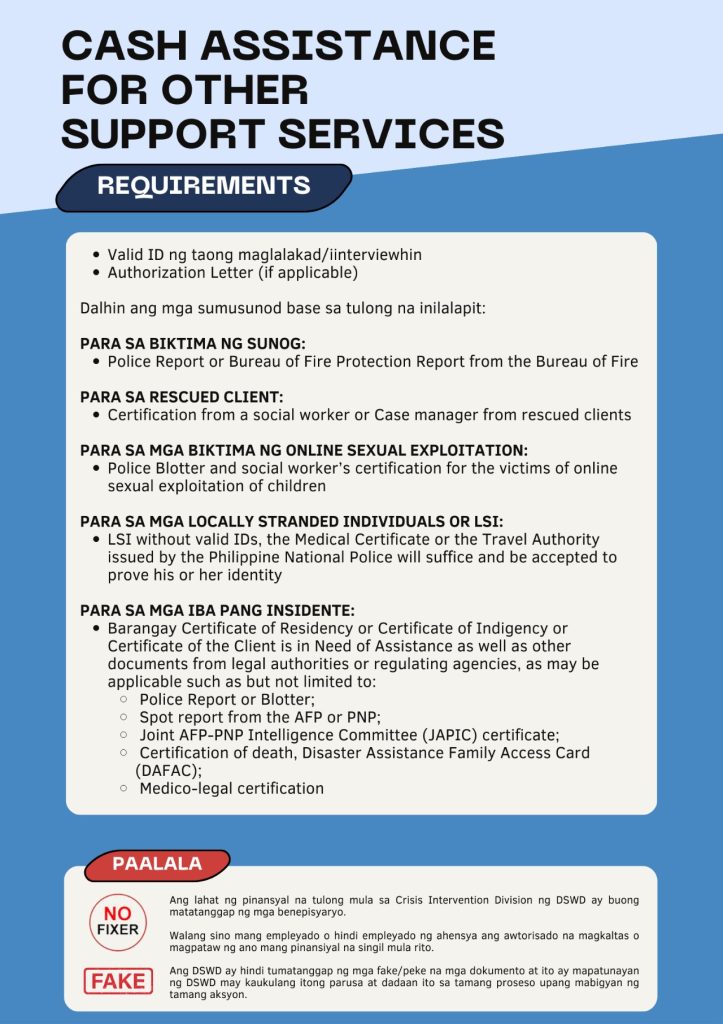
This is direct financial help given to individuals or families facing extreme hardships. It aims to provide immediate relief for those in critical situations, ensuring they receive timely support when they need it most.
Particulars: Other needs
Cost of Assistance: 2,000.00 – 10,000.00
Frequency of Availment: Once for every applicable incident
Material Assistance
Material Assistance refers to the immediate provision of essential items in the form of food and non-food items for those in need. These include:
1. Family Food Packs
These include ready-to-eat meals, food vouchers, or other available food items for individuals and families in crisis, such as the homeless or disaster victims. Special packs may be tailored to the specific need of vulnerable groups like the elderly or pregnant women, based on recommendations from nutrition experts.
2. Hygiene and Sleeping Kits
These supply kits offer items like basic hygiene and sleeping essentials, commonly distributed during disaster situations to ensure basic sanitation and comfort.
3. Assistive Devices and Technologies
This covers provision of items and devices like wheelchairs, canes, and hearing aids, as well as technology to assist with mobility, hearing, vision, communication, and other needs. These aids support individuals with disabilities or special needs in managing daily tasks.
Psychosocial Support
Psychosocial Support aims to address the psychological, emotional, and social needs of individuals and families affected by crises. It provides interventions to help manage stress and improve behavior during challenging times.
1. Psychological First Aid (PFA)
This offers immediate comfort and counseling to people impacted by disasters or trauma. This support is available to individuals of all ages and helps them cope with initial shock and stress.
2. Social Work Counseling
This helps clients understand their feelings and behaviors. It guides them in processing their emotions and finding solutions to their problems during a crisis.
Referral Services
When the AICS program or DSWD cannot provide the needed support, referral services help clients find alternative assistance. The program links people to other support programs when the requested assistance is beyond what AICS or DSWD can provide. Clients may be directed to local Social Welfare and Development Offices (LSWDOs) or their residence for additional case management. This ensures they receive the necessary support from other agencies or services.
Note: Even repeat or recurring beneficiaries (as those with maintenance medications) have to undergo assessment every time they request for assistance.
Modes of Providing Assistance
The AICS offers assistance in various forms, including medical, burial, transportation, educational, and food aid, reflecting the changing needs of the community. The provision of assistance may be in different forms as well, depending upon the urgency of the need. Here are some of the different forms of disbursement for the various types of assistance under AICS:
1. Financial Assistance
- Outright Cash
- Available for amounts of P10,000.00 and below.
- Clients can claim it from the designated disbursing officer within the day, subject to fund availability.
- Social workers may recommend outright cash based on client circumstances.
- Guarantee Letter (GL)
- Used for assistance above P10,000.00, particularly for medical and funeral expenses.
- Prepared by a DSWD Social Worker, detailing the type and amount of assistance.
- Considered urgent and prioritized for signing by approving authorities.
- Clients present the GL to service providers, with payments made directly by DSWD.
2. Material Assistance
- Clients must appear in person and present identification documents.
- The PMB-CID and FOs’ CIS prepare proposals for material assistance.
- DSWD may engage partners/service providers for distribution.
3. Disbursement Strategies (if applicable)
- Payment through electronic or digital means.
- Cash card payments.
- Transfer of funds to other National Government Agencies or Local Government Units.
- Additional methods to expedite assistance distribution may be implemented.
Video: What is AICS by DSWD?
Do you need help paying for your hospital and medical bills, securing medicine, transportation, or food? Then the DSWD AICS Program is one of your beat bets. In fact, it is one of the most comprehensive government program for people in crisis. To better understand the DSWD AICS Program, you may watch this video from News5Everywhere and listen as DSWD Asec Romel Lopez explains the program coverage, benefits, and requirements:
Summary
The DSWD AICS program provides vital assistance to individuals and families facing unexpected crises or extreme difficult situations, offering various forms of support including financial, material, psychosocial, and referral services. If you or someone you know is in need of assistance, don’t hesitate to reach out to the DSWD to enjoy the benefits of the AICS program for help during challenging times.
